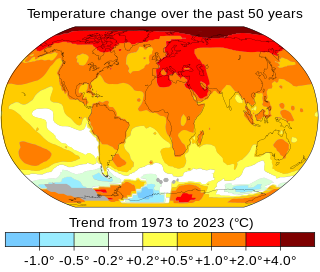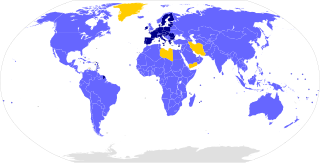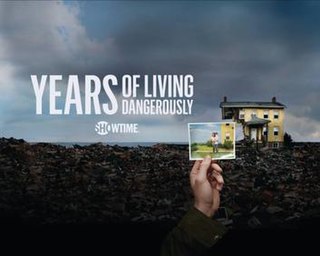Related Research Articles

The global warming controversy concerns the public debate over whether global warming is occurring, how much has occurred in modern times, what has caused it, what its effects will be, whether any action can or should be taken to curb it, and if so what that action should be. In the scientific literature, there is a strong consensus that global surface temperatures have increased in recent decades and that the trend is caused by human-induced emissions of greenhouse gases. No scientific body of national or international standing disagrees with this view, though a few organizations with members in extractive industries hold non-committal positions, and some have attempted to convince the public that climate change is not happening, or if the climate is changing it is not because of human influence, attempting to sow doubt in the scientific consensus.
The United Nations Framework Convention on Climate Change (UNFCCC) is an international environmental treaty addressing climate change, negotiated and signed by 154 states at the United Nations Conference on Environment and Development (UNCED), informally known as the Earth Summit, held in Rio de Janeiro from 3 to 14 June 1992. It established a Secretariat headquartered in Bonn and entered into force on 21 March 1994.

Climate change and agriculture are interrelated processes, both of which take place on a global scale. Global warming affects agriculture in a number of ways, including through changes in average temperatures, rainfall, and climate extremes ; changes in pests and diseases; changes in atmospheric carbon dioxide and ground-level ozone concentrations; changes in the nutritional quality of some foods; and changes in sea level.

There is currently a strong scientific consensus that the Earth is warming and that this warming is mainly caused by human activities. This consensus is supported by various studies of scientists' opinions and by position statements of scientific organizations, many of which explicitly agree with the Intergovernmental Panel on Climate Change (IPCC) synthesis reports.
The Union of Concerned Scientists (UCS) is a nonprofit science advocacy organization based in the United States. The UCS membership includes many private citizens in addition to professional scientists. Anne Kapuscinski, Sherman Fairchild professor of sustainability science in the Environmental Studies Program at Dartmouth College, currently chairs the UCS Board of Directors, having replaced James J. McCarthy, Professor of Biological Oceanography at Harvard University and past president of the American Association for the Advancement of Science in 2015.

The effects of climate change span the physical environment, ecosystems and human societies. It also includes the economic and social changes which stem from living in a warmer world. Human-caused climate change is one of the threats to sustainability.

Climate change mitigation consists of actions to limit the magnitude or rate of global warming and its related effects. This generally involves reductions in human emissions of greenhouse gases (GHGs).

The complex politics of global warming results from numerous cofactors arising from the global economy's dependence on carbon dioxide emitting fossil fuels; and because greenhouse gases such as CO
2, methane and N
2O cause global warming.
- Implications to all aspects of a nation-state's economy: The vast majority of the world economy relies on energy sources or manufacturing techniques that release greenhouse gases at almost every stage of production, transportation, storage, delivery & disposal while a consensus of the world's scientists attribute global warming to the release of CO
2 and other greenhouse gases. This intimate linkage between global warming and economic vitality implicates almost every aspect of a nation-state's economy; - Perceived lack of adequate advanced energy technologies: Fossil fuel abundance and low prices continue to put pressure on the development of adequate advanced energy technologies that can realistically replace the role of fossil fuels—as of 2010, over 91% of the world's energy is derived from fossil fuels and non-carbon-neutral technologies. Without adequate and cost effective post-hydrocarbon energy sources, it is unlikely the countries of the developed or developing world would accept policies that would materially affect their economic vitality or economic development prospects;
- Industrialization of the developing world: As developing nations industrialize their energy needs increase and since conventional energy sources produce CO
2, the CO
2 emissions of developing countries are beginning to rise at a time when the scientific community, global governance institutions and advocacy groups are telling the world that CO
2 emissions should be decreasing. - Metric selection (transparency) and perceived responsibility / ability to respond: Among the countries of the world, disagreements exist over which greenhouse gas emission metrics should be used like total emissions per year, per capita emissions per year, CO2 emissions only, deforestation emissions, livestock emissions or even total historical emissions. Historically, the release of CO
2 has not been even among all nation-states, and nation-states have challenges with determining who should restrict emissions and at what point of their industrial development they should be subject to such commitments; - Vulnerable developing countries and developed country legacy emissions: Some developing nations blame the developed world for having created the global warming crisis because it was the developed countries that emitted most of the CO
2 over the twentieth century and vulnerable countries perceive that it should be the developed countries that should pay to fix the problem; - Consensus-driven global governance models: The global governance institutions that evolved during the 20th century are all consensus driven deliberative forums where agreement is difficult to achieve and even when agreement is achieved it is almost impossible to enforce;
- Well organized and funded special-interest lobbying bodies: Special interest lobbying by well organized groups, such as the fossil fuels lobby, distort and amplify aspects of the challenge.
Business action on climate change includes a range of activities relating to global warming, and to influencing political decisions on global-warming-related regulation, such as the Kyoto Protocol. Major multinationals have played and to some extent continue to play a significant role in the politics of global warming, especially in the United States, through lobbying of government and funding of global warming deniers. Business also plays a key role in the mitigation of global warming, through decisions to invest in researching and implementing new energy technologies and energy efficiency measures.

Climate change adaptation (CCA) is a response to global warming.

Climate change includes both the global warming driven by human emissions of greenhouse gases, and the resulting large-scale shifts in weather patterns. Though there have been previous periods of climatic change, since the mid-20th century the rate of human impact on Earth's climate system and the global scale of that impact have been unprecedented.
The Stern Review on the Economics of Climate Change is a 700-page report released for the Government of the United Kingdom on 30 October 2006 by economist Nicholas Stern, chair of the Grantham Research Institute on Climate Change and the Environment at the London School of Economics (LSE) and also chair of the Centre for Climate Change Economics and Policy (CCCEP) at Leeds University and LSE. The report discusses the effect of global warming on the world economy. Although not the first economic report on climate change, it is significant as the largest and most widely known and discussed report of its kind.

The CDP is an international non-profit organisation based in the United Kingdom, Germany and the United States of America that helps companies and cities disclose their environmental impact. It aims to make environmental reporting and risk management a business norm, driving disclosure, insight, and action towards a sustainable economy. Since 2002 over 8,400 companies have publicly disclosed environmental information through CDP.

Climate change denial, or global warming denial is denial, dismissal, or unwarranted doubt that contradicts the scientific consensus on climate change, including the extent to which it is caused by humans, its effects on nature and human society, or the potential of adaptation to global warming by human actions. Many who deny, dismiss, or hold unwarranted doubt about the scientific consensus on anthropogenic global warming self-label as "climate change skeptics", which several scientists have noted is an inaccurate description. Climate change denial can also be implicit, when individuals or social groups accept the science but fail to come to terms with it or to translate their acceptance into action. Several social science studies have analyzed these positions as forms of denialism, pseudoscience, or propaganda.
Climate risk refers to risk assessments based on formal analysis of the consequences, likelihoods and responses to the impacts of climate change and how societal constraints shape adaptation options. Common approaches to risk assessment and risk management strategies based on natural hazards have been applied to climate change impacts although there are distinct differences. Based on a climate system that is no longer staying within a stationary range of extremes, climate change impacts are anticipated to increase for the coming decades despite mitigation efforts. Ongoing changes in the climate system complicates assessing risks. Applying current knowledge to understand climate risk is further complicated due to substantial differences in regional climate projections, expanding numbers of climate model results, and the need to select a useful set of future climate scenarios in their assessments.

Climate change in Australia has been a critical issue since the beginning of the 21st century. Australia is becoming hotter, and more prone to extreme heat, bushfires, droughts, floods and longer fire seasons because of climate change.

Global climate change was first addressed in United States policy beginning in the early 1950s. The Environmental Protection Agency (EPA) defines climate change as "any significant change in the measures of climate lasting for an extended period of time." Essentially, climate change includes major changes in temperature, precipitation, or wind patterns, as well as other effects, that occur over several decades or longer. Climate change policy in the U.S. has transformed rapidly over the past twenty years and is being developed at both the state and federal level.

The Paris Agreement is an agreement within the United Nations Framework Convention on Climate Change (UNFCCC), dealing with greenhouse-gas-emissions mitigation, adaptation, and finance, signed in 2016. The agreement's language was negotiated by representatives of 196 state parties at the 21st Conference of the Parties of the UNFCCC in Le Bourget, near Paris, France, and adopted by consensus on 12 December 2015. As of February 2020, all UNFCCC members have signed the agreement, 189 have become party to it, and the only significant emitters which are not parties are Iran and Turkey.

Individual action on climate change can include personal choices in many areas, such as diet, means of long- and short-distance travel, household energy use, consumption of goods and services, and family size. Individuals can also engage in local and political advocacy around issues of climate change.

Years of Living Dangerously is an American documentary television series focusing on global warming. The first season was broadcast in the US in 2014 on Showtime. It won an Emmy Award as Outstanding Documentary or Nonfiction Series. The second season aired on the National Geographic Channel in 2016. Executive producers included James Cameron, Arnold Schwarzenegger, and series creators Joel Bach and David Gelber. Joseph Romm and Heidi Cullen were the chief science advisors.
References
- ↑ Deutsch, Claudia (June 19, 2007). "Climate-Change Scorecard Aims to Influence Consumers". New York Times. Retrieved 2008-08-01.
- ↑ Climate Counts Official Site
- ↑ Link to the Scorecard: http://www.climatecounts.org/pdf/Climate_Counts_Scorecard.pdf